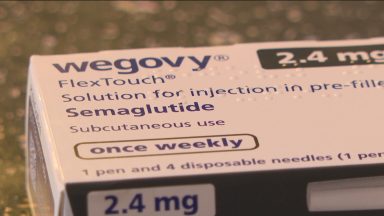Alzheimer’s patients are facing a “heartbreaking setback” as the result of a decision not to approve a drug which has been shown to slow the progression of the disease for use by the NHS in Scotland.
The Scottish Medicines Consortium (SMC), the body which approves drugs for use in the health service, said there was “uncertainty” around the “modest clinical benefit” of the drug lecanemab.
SMC chair Dr Scott Muir said: “Having considered all the evidence, we were unable to accept lecanamab for treatment in the NHS in Scotland.”
The drug is the first Alzheimer’s treatment of its kind to be licensed for use in Great Britain.
But the National Institute for Health and Care Excellence (Nice), which approves medicines for use by the NHS in England and Wales, had already recommended it not be rolled out there due to the cost to the taxpayer.
And Dr Muir said the SMC had “felt that there remains uncertainty around what the modest clinical benefit means for patients and their families and, in addition, the cost-effective estimates supplied by the company were too high”.
Stressing, however, the “need for new therapies for Alzheimer’s disease,” Dr Muir said the SMC would “welcome a resubmission” if these issues could be addressed.
The UK Medicines and Healthcare products Regulatory Agency (MHRA) has already deemed lecanemab – developed by pharmaceutical company Eisai and sold under the brand name Leqembi – efficient at slowing Alzheimer’s disease.
The targeted antibody treatment binds to amyloid, a protein which builds up in the brains of people living with the condition.
It is designed to help clear the build-up and slow down cognitive decline and is given to patients through an intravenous drip fortnightly.
Reacting to the SMC announcement, Hilary Evans-Newton, chief executive at Alzheimer’s Research UK, said: “Today’s decision is a heartbreaking setback for people in Scotland living with early-stage Alzheimer’s disease.
“Instead of being offered a treatment that could slow the devastating effects of Alzheimer’s, only those who can afford to pay will be able to access lecanemab, which is priced around £60,000 per year.
“This is something out of reach for many families already carrying the financial and emotional weight of care, with some even giving up their careers to support loved ones.”
She added: “Like first-generation treatments for other diseases, lecanemab has modest benefits and side effects that need careful monitoring.
“But it can offer people with early-stage Alzheimer’s the chance to slow down this devastating disease and that’s a chance they deserve.”
Ms Evans-Newton said that “similar to decisions in England and Wales, today’s outcome is driven by the costs of expanding diagnostic infrastructure, including brain scans, and administering infusions”.
Campaigners at Alzheimer Scotland, meanwhile, said they were “disappointed” by the decision, which chief executive Henry Simmons said was “based on the medicine’s cost in relation to the evidence of its clinical benefit”.
However, he added: “Unlike the decision made by the National Institute for Health and Care Excellence (Nice) in England and Wales, the SMC did not consider the cost of implementing and developing new diagnostic and treatment pathways as part of their assessment.
“This gives us hope that this is not the end of the road for this potentially life-changing drug and that there might be an opportunity for further discussions and negotiation on the issue of the medicine costs rather than these other costs, which in our view should simply be part of a progressive NHS approach to the treatment of Alzheimer’s disease.”
Mr Simmons added: “We know this decision by the SMC will be disappointing for many people. This remains the first new drug shown to slow down the progression of Alzheimer’s disease, rather than simply treating the symptoms.
“Alzheimer Scotland will continue to do all that we can to represent the views of people living with dementia and their carers to ensure that the human costs and views of people with lived experience are reflected in this process.
“We remain optimistic that these initial hurdles will be overcome and, after decades of waiting, that new treatments will be approved for NHS use soon.”
Follow STV News on WhatsApp
Scan the QR code on your mobile device for all the latest news from around the country


 PA Media
PA Media























